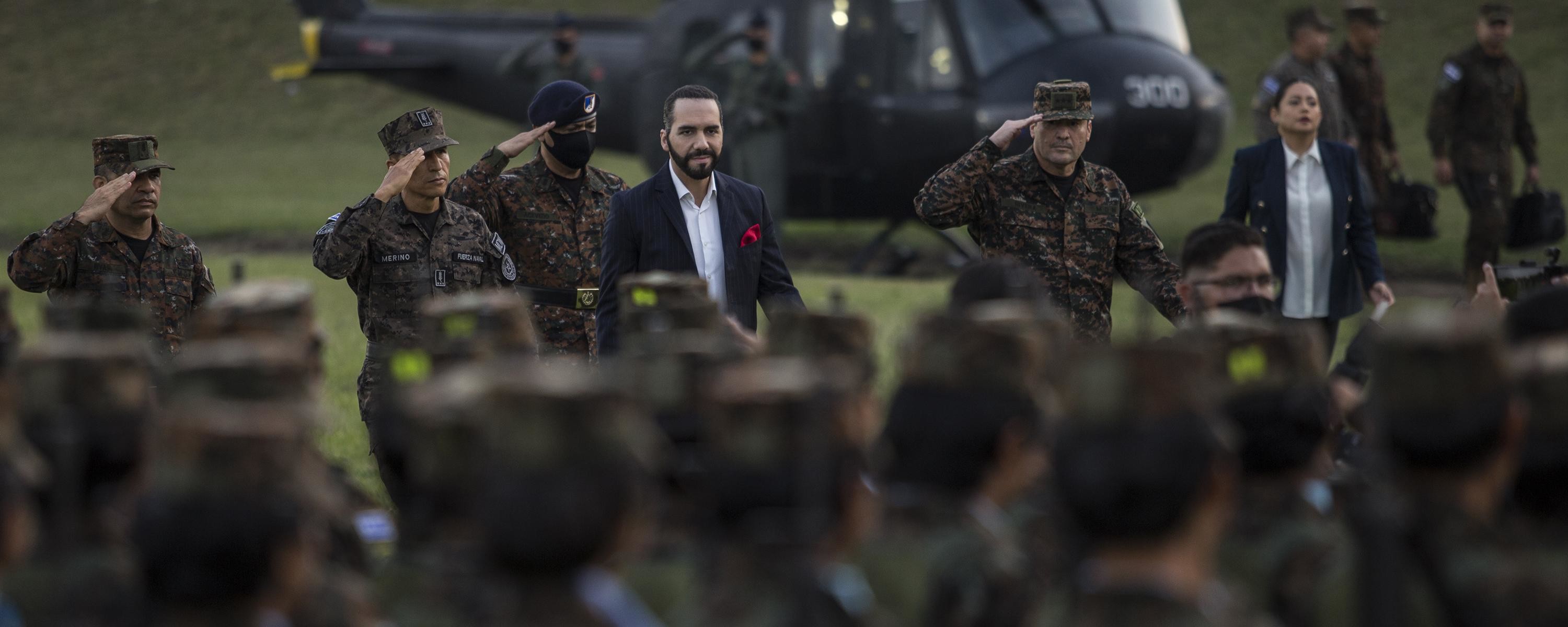On Sunday, the Salvadoran Legislative Assembly voted to extend for 30 days the state of exception that has curbed civil liberties in response to a three-day spike in homicides one month ago. First set to expire on Wednesday, it will now continue until May 27.
The decision comes as reports of arbitrary arrests and human rights abuses during the first 30 days have been mounting. The extension means that rights to association and legal counsel when arrested will remain suspended, and the maximum period for detention before seeing a judge remains an extended 15 days rather than the usual 72 hours.
The government claims to have arrested more than 17,000 gang members since the state of exception began, and the police union claims it received reports of arrest quotas imposed under threat of transfer to undesirable posts. “More than 1,000 terrorists captured just today,” Bukele tweeted on Sunday.
While one month ago the surge in violence was the main argument for invoking the state of exception, police data show the trend dramatically reversed after a few days. Bukele renewed the state of exception despite the fact that from April 1 through last Sunday the country registered just 0.8 homicides per day, far below last year’s average of 3.1.
Ruling-party legislators said they would not stop the extraordinary measures until they arrested all the country’s gang members —estimated at about 70,000— yet they have not articulated any broader security strategy. For decades the question of the gangs has been addressed through failed but politically popular crackdowns that fueled cycles of retribution and towering rates of violence.
“Universities instead of prisons”
“Apart from the merely political speeches, no official or legislator stopped to explain how the renewal of the state of exception will resolve, in the short term, some of the country's longstanding problems, such as the high caseload of judges, prosecutors, and public defenders or the overcrowding in prisons, where there were already about 39,000 inmates,” writes El Faro reporter Gabriel Labrador.
El Salvador has the second-highest per capita incarceration rate in the Americas after the United States and looks poised to defend that distinction. Bukele’s party passed new legislation last week to build an unspecified number of new prisons in rural areas around the country. The law will give the Ministry of Public Works the authority to mark land and facilities for expropriation and bypass contract procurement oversight.
“More prisons for gang members, so they never again see the light of day,” tweeted Nuevas Ideas bloc chair Christian Guevara, who last May claimed Bukele-run prisons were “spaces for reinsertion.”
Bukele himself, as a presidential candidate, pledged to build “universities instead of prisons.”
International and local civic organizations have roundly criticized the state of exception for infringing on human rights without having any proven impact on improving security. The Inter-American Commission on Human Rights called on El Salvador to take actions that “guarantee public safety and respect for rights and human dignity.”
Instead, the mass arrests have led to overcrowded prison cells and throngs of distressed wives, mothers, and girlfriends outside looking for information about their sons and partners and even bringing them their meals, reports El Faro’s Carlos Martínez.
Reports of dozens of Salvadorans without apparent gang affiliations swept up in the arrests have been documented by human rights groups and on social media. On April 9, four workers from a popular San Salvador coffee shop were detained until the Bukele-sympathetic owner, the national baristas’ champion, directly petitioned the president on Twitter for their release.
On April 15, Kevin Rivas, a 24-year-old audiovisual producer, was arrested in his house in Soyapango. “My son’s only sin is living in a conflict zone,” tweeted his mom. He was released two days later after outcry from friends and family. On April 18, street food vendor Roxana Cortez was arrested in Alegría, Usulután. Her daughter denounced on Twitter that the family has not been given any reason for her arrest.
Bukele has assailed critics as defenders of criminals and passed legislation that press advocates warn censors reporting on gangs. Following the reforms, his allies have threatened journalists with criminal investigations and smeared them as “informational terrorists.”
The president of the Legislative Assembly went as far as to ask critical journalists to simply leave the country. “These ‘uncomfortable’ journalists say they’re scared,” he said during an Assembly session on Apr. 19, in allusion to El Faro’s longtime marketing slogan, ‘periodismo incómodo.’ He added: “We don’t need them here. Leave!”
Bukele defended the extension of the state of exception as democratic because it passed with the necessary votes Sunday.
Hiding Government Payments
The president also sponsored new legislation to exempt security spending from legal oversight for that period, similar to legislation approved during the pandemic that led to irregular spending. By the end of 2020, 66 percent of government purchases revealed some irregularity, according to the Attorney General’s Office.
“Logically, if we are facing an emergency situation to combat and control this wave of violence, we need deadlines and contracts to be accelerated,” said Nuevas Ideas legislator Jorge Castro. “This has nothing to do with transparency. It has to do with obtaining the tools as soon as possible.”
El Faro previously revealed that Bukele’s chief of prisons, Osiris Luna, took advantage of loosened pandemic-era spending regulations to embezzle $1.6 million in food aid meant for needy Salvadoran families. In December of the following year the U.S. Treasury sanctioned Luna, and then did the same to Bukele’s chief of cabinet for leading a “multi-ministry, multi-million-dollar corruption scheme” during the pandemic.
Luna was also accused by the U.S. for leading secret gang negotiations on behalf of Bukele’s administration in order to curb the homicides in the country. Experts say that a crunch in this negotiation could be at the root of the abrupt violence spike one month ago.

